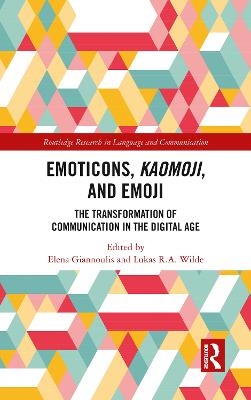
Emoticons, Kaomoji, and Emoji
Routledge (Verlag)
978-0-367-78521-5 (ISBN)
This collection offers a comprehensive treatment of emoticons, kaomoji, and emoji, examining these digital pictograms and ideograms from a range of perspectives to comprehend their increasing role in the transformation of communication in the digital age. Featuring a detailed introduction and eleven contributions from an interdisciplinary group of scholars, the volume begins by outlining the history and development of the field, situating emoticons, kaomoji, and emoji – expressing a variety of moods and emotional states, facial expressions, as well as all kinds of everyday objects– as both a topic of global relevance but also within multimodal, semiotic, picture theoretical, cultural and linguistic research. The book shows how the interplay of these systems with text can alter and shape the meaning and content of messaging and examines how this manifests itself through different lenses, including the communicative, socio-political, aesthetic, and cross-cultural. Making the case for further study on emoticons, kaomoji, and emoji and their impact on digital communication, this book is key reading for students and scholars in sociolinguistics, media studies, Japanese studies, and language and communication.
Elena Giannoulis is Junior Professor for Japanese Literature at the Friedrich Schlegel Graduate School of Literary Studies at Freie Universität Berlin, Germany. Lukas R.A. Wilde is Post-Doctoral Research Associate at the Collaborative Research Center (CRC) 923 "Threatened Order—Societies under Stress" at the University of Tuebingen, Germany.
1. Emoticons, Kaomoji, and Emoji: The Transformation of Communication in the Digital Age
Part 1: Intercultural Mediations
2. Not Everyone ����s: Or, The Question of Emoji as a ‘Universal’ Form of Expression
3. Cultural Literacy in the Empire of Emoji Signs: Who is ����?
4. Emoticons: Digital Lingua Franca or a Culture-Specific Product Leading to Misunderstandings?
Part 2: Intersectional Mediations
5. 'Impact taisetsu da!': The Use of Emoji and Kaomoji in Dansō Escort Blogs between Gender Expression and Emotional Labour
6. Emoticons in Social Media: The Case of Japanese Facebook Users
Part 3: Linguistic Mediations
7. ‘Iconographetic Communication’ in Digital Media: Emoji in WhatsApp, Twitter, Instagram, Facebook—from a Linguistic Perspective
8. A Cultural Exploration of the Use of Kaomoji, Emoji, and Kigō in Japanese Blog Post Narratives
Part 4: Pictorial Mediations
9. The Elephant in the Room of Emoji-Research: Or, Pictoriality, to What Extent?
10. Construction of Iconicity in Scenes of Kaomoji
Part 5: Material Mediations
11. Who Is Afraid of Mr. Yuk? The Display of the Basic Emotion of Disgust in an ‘Analogue Precursor’ to Contemporary Emoji
12. From Digital to Analog: Kaomoji on the Prayer Tablets of Anime Pilgrims
| Erscheinungsdatum | 06.04.2021 |
|---|---|
| Reihe/Serie | Routledge Research in Language and Communication |
| Verlagsort | London |
| Sprache | englisch |
| Maße | 152 x 229 mm |
| Gewicht | 362 g |
| Themenwelt | Geisteswissenschaften ► Sprach- / Literaturwissenschaft ► Sprachwissenschaft |
| Sozialwissenschaften ► Kommunikation / Medien ► Kommunikationswissenschaft | |
| Sozialwissenschaften ► Kommunikation / Medien ► Medienwissenschaft | |
| ISBN-10 | 0-367-78521-8 / 0367785218 |
| ISBN-13 | 978-0-367-78521-5 / 9780367785215 |
| Zustand | Neuware |
| Haben Sie eine Frage zum Produkt? |
aus dem Bereich


